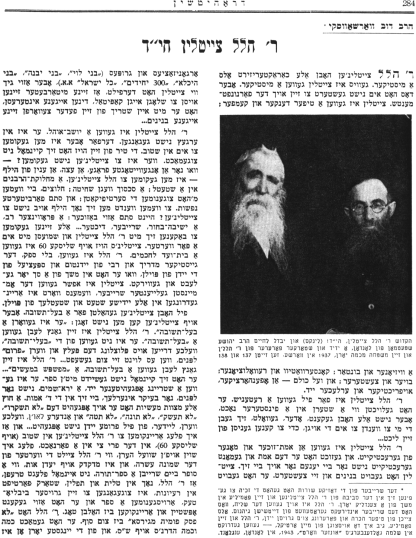
[Page 284]
Rabbi Dov Warshavsky*
[Page 285]
knowledgeable about Jewish mysticism [kabbalah], and never stopped studying the ancient text called The Zohar [Book of Splendor].
Today it is rare to find a penitent as profound as R. Hillel Zeitlin. R. Hillel never made any business out of his religiosity. The Agudath Israel, the Mizrachi and other religious parties used to try to get him to join their movements, but R. Hillel rejected all their attempts. He was highly non-partisan, and disliked back-room dealings and political machinations, and battled the parties' opportunism.
Even though R. Hillel was a mystic who aspired to reach the highest heavens, he was a person with both feet on the ground. He saw everything, his ears were always perked up, and he picked up even the smallest rustle in Jewish life. As a writer, he monitored the pulse of Jewish community life, and reacted with his entire being against any misdeed or injustice committed by the strong against the weak. He never bowed before anyone, and never pandered to anyone. He hated flattery as much as a Jew hates non-kosher meat.
R. Hillel Zeitlin said what he meant and meant what he said. He never showed favoritism. He stood like a tall oak tree (because of his height, wide shoulders and long beard and hair) planted deeply in the earth. No storm wind could move him from his place. He was a like a rock on the beach that remains unmoved by a wave (and there were many waves).
In his older years, R. Hillel Zeitlin didn't sing his songs in prose as he had in his youth, and didn't write any kabbalistic meditations. He merely roared like a wounded lion, and he wrote with blood rather than ink as he poured his heart onto paper.
R. Hillel Zeitin the visionary had seen the danger facing the Jewish People years earlier, and yelled with all his bitterness, “Jews, save yourselves! Why do the Jewish leaders stay silent? Jews, get out of Europe!” He was the Jeremiah of our generation, and hurled the bitter truth into the faces of the Jewish party leaders who were frequently more interested in their own party interests than in the good of the Jewish People.
There was no shortage of reasons why he couldn't speak directly to the Jewish masses in the newspapers he worked for, and Zeitlin published his won publications, brochures, newsletters and books (such as Speak to the Nations; Silence and Voice; Librarian of Individuals; The Word; My Word; What should the Jewish People do in the pre-Messianic Times?; The Speech of Prophet Jeremiah, son of Amotz, and What He Would Have Said Today; Alef, etc.) in which he thundered and sought to awaken the Jewish People from their apathy. Zeitlin called meetings for this purpose where he would pronounce his dire warnings.
I can still see the picture of R. Hillel at a large gathering of his followers called All Israel on Zamenhoff Street in 1937. [I was one of the organizers of the speakers who came to the meeting]. R. Hillel was so involved in the situation that he barely had any strength to cry out, “Jews, save yourselves!” and fell back onto his chair.
R. Hillel followed his own difficult and hard path, but he did so boldly and confidently together with his Jewish brethren right to the very end. It was a path of sanctification of G-d's name and bravery; of holiness and eternity. R. Hillel certainly had the choice and means to save himself, but he remained – like Jeremiah the Prophet who suffered self-inflicted punishment, dedication and reproof. But when the people went into exile, the prophet helped to bear the burden of that exile.
R. Hillel Zeitlin called on Jews to save themselves, and remained alone – that was how he was. A person like R. Hillel never abandons his role. He saw and felt the approaching danger, and warned his brothers who didn't listen. Zeitlin followed the same ancient and modern road of his brethren: the path of martyrdom, of self-sacrifice by sanctifying the name of G-d.
R. Hillel Zeitlin perished at the hands of the German murderers at the transport location in the Warsaw ghetto on the way to Treblinka on the eve of Rosh Hashanah, 1942. It is said that he traveled this last journey covered in his tallith and tefillin, holding a copy of the Zohar under his arm on his way to eternity. His wife Esther perished in a prior accursed aktsia of the Germans. May G-d avenge their blood! They had two sons and one daughter:
Aharon Zeitlin, a famous poet, writer and playwright, was born in February, 1939. [sic] He visited New York (on the occasion of the performance of one of his plays), and remained here, thereby surviving the German hordes (Aharon today is one of the leading contributors to the Yiddish newspaper Tog-Morgen Journal). Aharon's wife, Tolia – Toiba Leah (Perlmutter) – and son Zvi-Dov (Hersh-Ber) died in Treblinka in 1943. May G-d avenge their blood!
Elchanan Zeitlin, a famous writer, journalist and editor of Unzer [Our]Express
Previous Page
|
Next Page
JewishGen, Inc. makes no representations regarding the accuracy of
the translation. The reader may wish to refer to the original material
for verification.
JewishGen is not responsible for inaccuracies or omissions in the original work and cannot rewrite or edit the text to correct inaccuracies and/or omissions.
Our mission is to produce a translation of the original work and we cannot verify the accuracy of statements or alter facts cited.
 Drogichin, Belarus
Drogichin, Belarus
 Yizkor Book Project
Yizkor Book Project
 JewishGen Home Page
JewishGen Home Page
Copyright © 1999-2026 by JewishGen, Inc.
Updated 13 Dec 2001 by LA